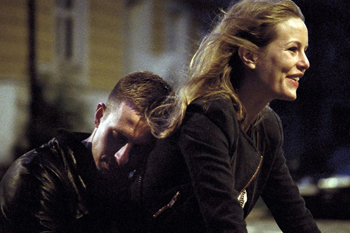LFF 2011: Oslo, August 31st ***
 Danish filmmaker Joachim Trier had the ominous task of bringing his second feature into the Festival arena this year, after 2006’s lauded debut Reprise. Like his first film, Trier seems to be carving out an early filmmaking pattern of producing strikingly realistic character studies, full of passion and human nature analysis. He again turns to one of his two leads of his first film, Anders Danielsen Lie, to help paint a moving picture of one person’s view of modern-day Scandinavian life – Danielsen Lie’s hometown of Oslo, and hence the title. While not a film for the dispirited – though such a mindset may better empathise with Anders’ soul-searching journey – it does have a peculiar honesty to it.
Danish filmmaker Joachim Trier had the ominous task of bringing his second feature into the Festival arena this year, after 2006’s lauded debut Reprise. Like his first film, Trier seems to be carving out an early filmmaking pattern of producing strikingly realistic character studies, full of passion and human nature analysis. He again turns to one of his two leads of his first film, Anders Danielsen Lie, to help paint a moving picture of one person’s view of modern-day Scandinavian life – Danielsen Lie’s hometown of Oslo, and hence the title. While not a film for the dispirited – though such a mindset may better empathise with Anders’ soul-searching journey – it does have a peculiar honesty to it.
Loosely based on fascist Pierre Drieu La Rochelle’s novel, Le feu follet, about the last days of an alcoholic who commits suicide, inspired by the death of Drieu’s friend, the surrealist poet Jacques Rigaut, Oslo, August 31st offers a similar premise. It follows a day in the life of Anders (Danielsen Lie), a young and once-gifted writer who is now a recovering drug addict in his thirties. After witnessing him calmly trying to take his own life by drowning in a lake, Anders takes a day pass to the capital, Oslo, to attend a job interview for a magazine writer position. Anders also uses the time to visit old friends, old haunts and assess where his life stands while pining for his ex who lives in New York.
The theme of the ‘tormented creative’ from the previous film is evident again in this. Trier suggests such a sensitive soul seeks a deeper perspective on existence, and is analytical to a fault, rather than just letting some of life’s mundane pass Anders by. In a way, we admire Anders for being so bold in tackling the ugliness in his heart, in trying to figure out where he may be going wrong in a city he presumably loves – as the loving monologue about Oslo spoken over old film of the Norwegian capital depicts at the start.
At the same time, there is a certain frustration with some of the characters’ responses to Anders’ inner scrutiny, which is part of the problem with what exactly this film is trying to say; there are no resolutions, other than the tragic, to begin answering some of life’s questions. There is an overwhelming sense of numbness at the end, and not just as a result of the conclusion, but a real sense of melancholy that not one of the seemingly affluent, middle-class people Anders visits has anything constructive to offer, or any glimmer of hope they are satisfied with their lot, however imperfect it may be at times.
To some, this may render Anders’ poignant pilgrimage and Trier’s latest piece quite pointless and cloaked in despair to be anything but a conceited acting-directing exercise. To others, this self-reflection shows great courage and strength of character, more so than Anders’ nearest and dearest in the film who seem to be hiding behind and clinging onto humdrum conventionality for fear of experiencing a vacuum. It is this intriguing stance from within of an apparently comfortable Scandinavian lifestyle, which some of us secretly covet, that always makes such films so utterly fascinating.
The other universal point that Trier seems to be making in Oslo, August 31st is the growing fear of starting life over again, late into adulthood, which is especially topical with global austerity at the moment. However, there is little to appease us in this respect in the film. It is as it is: quite terrifying, with no one to rescue the situation. This lack of spiritual restoration is what shocks the most after watching Oslo, not Anders’ actions.
Trier directs another contestable film that will spark debate, but that showcases Danielsen Lie’s emerging talents once more in a luminous fashion. It’s just a shame there are not more positives to be taken away from Oslo, merely a heavy heart.
3/5 stars
By @FilmGazer
**WATCH THE TRAILER HERE**